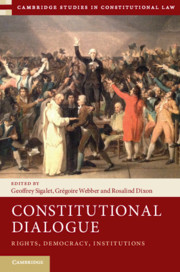Book contents
- Constitutional Dialogue
- Cambridge Studies in Constitutional Law
- Constitutional Dialogue
- Copyright page
- Contents
- Contributors
- Preface and Acknowledgements
- Note on the Cover Image
- 1 Introduction
- Part I Dialogue and Democracy
- 2 Dialogue and Its Myths
- 3 Departmentalism and Dialogue
- 4 On Dialogue and Domination
- Part II Dialogue and Institutions
- Part III Dialogue and Rights
- Part IV Case Studies of Dialogue
- Part V International and Transnational Dialogues
- Index
4 - On Dialogue and Domination
from Part I - Dialogue and Democracy
Published online by Cambridge University Press: 19 April 2019
- Constitutional Dialogue
- Cambridge Studies in Constitutional Law
- Constitutional Dialogue
- Copyright page
- Contents
- Contributors
- Preface and Acknowledgements
- Note on the Cover Image
- 1 Introduction
- Part I Dialogue and Democracy
- 2 Dialogue and Its Myths
- 3 Departmentalism and Dialogue
- 4 On Dialogue and Domination
- Part II Dialogue and Institutions
- Part III Dialogue and Rights
- Part IV Case Studies of Dialogue
- Part V International and Transnational Dialogues
- Index
Summary
- Type
- Chapter
- Information
- Constitutional DialogueRights, Democracy, Institutions, pp. 85 - 126Publisher: Cambridge University PressPrint publication year: 2019
- 1
- Cited by

